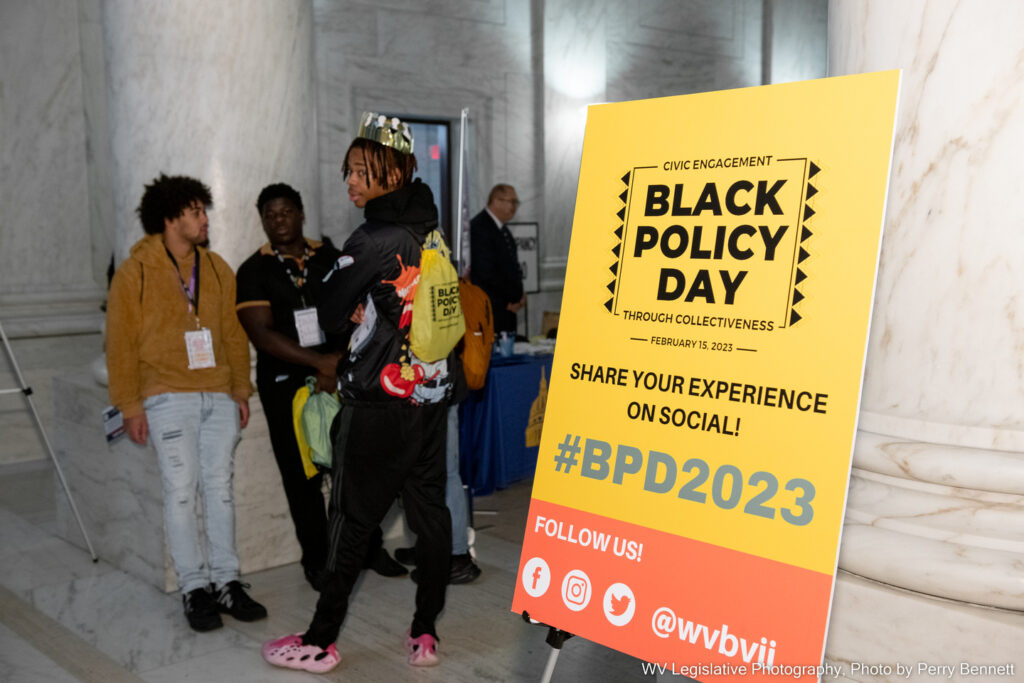Wednesday was Black Policy Day at the West Virginia Legislature. The event is in its second year and is an opportunity for advocates to highlight the policy issues facing Black West Virginians.
Katonya Hart, one of the day’s organizers, said she wants the legislative process to be open so that all can participate. This year, the day’s focus expanded to not only look at policy, but also to help community members learn about and engage with the process directly.
“It’s that diversity when everyone’s at the table,” Hart said. “Having an opportunity to put in that we become strong, that there is a ‘we’ and there’s no longer that separation, that we’re able to keep our identity while supporting and standing in solidarity with each other.”
She said the day’s focus is broad, bringing attention and action to issues facing all West Virginians. Hart is tracking more than 200 bills this session. However one bill, the CROWN Act, is of particular interest. Hart and many other activists around the rotunda wore crowns during the day as a symbol of support for the legislation.
“CROWN stands for, ‘creating a respectable and open world for natural hair and culturally relevant hairstyles,’” Hart said.
“If I wake up in the morning and I wash my hair and I go to work and not straighten it, perm it, it’s okay,” she continued. “Nobody’s gonna say ‘That looks wild and unruly and unprofessional,’ and send me home and try to have me press it like another culture’s hair in order to file papers, to type a letter. What is the necessity of that? What is the reason for that? But so many people have found themselves in that situation, showing up for work and someone saying ‘Your Afro, your curly hair is just not professional.’”
Several municipalities, including Morgantown, Charleston and Beckley, have created their own ordinances to codify the CROWN Act’s protection locally, but advocates have been waiting to see it become state law for four years.
Hart listed issues of funding for education, the regulating of women’s bodies and legislation targeted at the LGBTQ+ community as other areas of focus.
Kasha Snyder-McDonald, the president of the West Virginia Black Pride Foundation, echoed the importance of passing the CROWN Act.
“People of color, we do have distinct hair, hair quality, something that Caucasian people have no understanding of,” she said. “Therefore it is no other body’s place to tell a person of color, what to do with their hair, how we wear our hair. Our hair is a sign of our glory.”
As an LGBTQ+ advocate, Snyder-McDonald also had her eye on several bills aimed at banning drag shows in the state, which she said is often a crucial source of income for people in the community.
“People are scared of what they do not understand or what they do not know. When it comes to the drag community, they do not know that some people that do drag, the majority of people that do drag, is because it is their livelihood, it is their way of employment,” Snyder-McDonald said. “There are so many doors that are close to the LGBTQ+ community, especially the LGBTQ+ community of color.”
“Here in West Virginia, we don’t have a lot of representation for the LGBTQ+ community, including within our own community,” she continued. “It’s very hard for us to get people to understand our vision and to see that we’re here and we’re just like everyone else. Each and every day is a struggle. We’re fighting just to be seen and just to be heard.”
Snyder-McDonald and Hart both expressed their excitement for the opportunity that Black Policy Day provides for Black West Virginians to organize and stand together for a better future.




















